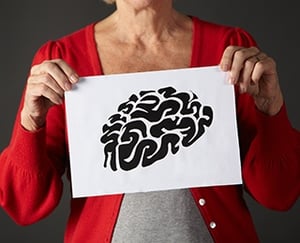Published: September 19, 2018
 We know the value of an annual physical. After reviewing blood and urine samples, taking our blood pressure, administering an EKG and other tests, our doctor can give us a good picture of our physical health.
We know the value of an annual physical. After reviewing blood and urine samples, taking our blood pressure, administering an EKG and other tests, our doctor can give us a good picture of our physical health.
But what about our brain health?
As we age, our risk for dementia increases. Most individuals with Alzheimer’s disease, the most common type of dementia, are 65 and older. After age 65, the risk of Alzheimer's doubles every five years. After age 85, the risk reaches one-third.
While our primary care physician may touch on memory and other brain-related issues during our annual physical, a more comprehensive evaluation is needed if you or a loved one are concerned about dementia. Later in this article, we’ll list the early signs of dementia, but first, let’s talk about keeping our brain in good shape.
“Growing evidence indicates that people can reduce their risk of cognitive decline by adopting key lifestyle habits,” according to the Alzheimer’s Association, which has come up with “10 Ways to Love Your Brain.”
1. Get Moving
Several studies have found a correlation between increased physical activity and reduced cognitive decline. Cardiovascular exercise such as running elevates your heart rate and increases blood flow to the brain and body, but there are also mental benefits from low-intensity activities such as yoga.
“The verdict is still out on an ideal exercise “dose” for brain health, because in short, it’s complicated,” writes physical therapist Joyce Gomes-Osman in Harvard Health Publishing. “The long answer is that we are still learning about all the ways in which exercise changes our biology, since not all exercise is created equal, and of course it ultimately depends on who we are, for we are all different.”
“So in the meantime, it seems that since aerobic exercise, resistance training, and mind-body exercises are all associated with evidence specifically supporting benefits for brain health, you should maintain a diverse practice, using these exercises as the building blocks of your regimen.”
2. Be a Lifelong Learner
Learn a foreign language, sign up for a college course or pursue a new skill, such as jewelry making or pottery.
In one study, neuroscientist Dr. Denise Park randomly assigned 200 older adults to spend 15 hours a week for three months learning either quilting or digital photography. Other groups were assigned to watch movies, listen to the radio, play easy puzzles and other non-challenging activities.
The quilters and photographers scored high.
"We found quite an improvement in memory, and we found that when we tested our participants a year later, that was maintained," Park says
3. Stop Smoking
“Evidence shows that smoking increases the risk of cognitive decline. Quitting smoking can reduce that risk to levels comparable to those who have not smoked,” according to the Alzheimer’s Association.
4. Take Care of Your Heart
According to published research entitled “Cardiovascular Disease Risk Factors and Cognition in the Elderly”
“While it is relatively widely known that cardiovascular disease can result in cognitive decline, it is becoming increasingly clearer that actual risk factors for cardiovascular disease, such as high blood pressure, diabetes, and obesity are also associated with alterations to brain structure and cognition. The prevalence of cardiovascular disease risk factors increase exponentially with age and are often overlooked as a source of cognitive changes that are otherwise thought to be part of the ‘normal’ aging process.”
The risk of developing Alzheimer’s or vascular dementia appears to be increased by many conditions that damage the heart and blood vessels, such as heart disease, diabetes, stroke, high blood pressure and high cholesterol.
5. Prevent a Head Injury
We can’t do anything about such Alzheimer’s risk factors as age and genetics, but we can do our part to prevent a head injury, also a risk factor for dementia. Buckle up in a car, and wear a helmet when biking, riding a motorcycle or horse or engaging in other high-risk activities.
Also fall-proof your home, where six out of every 10 falls occur. Here are five suggestions from the National Institute on Aging:
- Make sure you have good lighting and switches located at the top and bottom of stairs and remember to use them;
- Don’t use throw rugs;
- Mount grab bars near toilets and on both the inside and outside of your tub and shower;
- Keep a flashlight by your bed in case of power outage;
- Don't stand on a chair or table to reach something that's too high—use a "reach stick" or ask for help.
Studies have found that two diets – the Mediterranean and the MIND – can improve memory and thinking in older adults.
The Mediterranean diet includes eating primarily plant-based foods (fruits, vegetables, whole grains, nuts), using olive oil instead of butter, herbs and spices instead of salt, and fish and poultry instead of red meat.
“Research has shown that the traditional Mediterranean diet reduces the risk of heart disease. The Mediterranean diet is also associated with a reduced incidence of cancer, and Parkinson's and Alzheimer's diseases,” the Mayo Clinic Staff writes.
The MIND diet—Mediterranean-DASH Intervention for Neurodegenerative Delay—was developed following research that found combining Mediterranean and DASH Diets could lower the risk of Alzheimer’s.
MIND focuses on 15 food groups – 10 that are good, such as berries and green leafy vegetables, and 5 to avoid, like red meat and cheese.
Get more information on nutritional needs after 50, by downloading our "Feed Your Body Right" guide!
7. Get a Good Night’s Sleep
Insomnia, sleep apnea and other sleep disorders can cause problems with memory and thinking.
“Some recent research shows sticking to a regular sleep schedule, limiting caffeine and alcohol right before you go to bed, and getting adequate sleep in regular patterns is important,” says Jennifer Brush, director of Healthcare Research and Education at the Brush Development Company.
The National Sleep Foundation recommends people 65 years of age and older get seven to eight hours of sleep.
Napping is a healthy habit for many older adults, improving alertness and mood, and generally doesn’t affect nighttime sleeping.
“However, if you experience insomnia or poor sleep quality at night, napping might worsen these problems. Long or frequent naps might interfere with nighttime sleep.,” according to the Mayo Clinic.
8. Mental Health Matters
Some studies link a history of depression with an increased risk of cognitive decline, so seek medical treatment if you have symptoms of depression, anxiety or other mental health concerns.
“We can’t say that late-life depression causes dementia, but we can say it likely contributes to it,” said Meryl Butters, an associate professor of psychiatry at the University of Pittsburgh School of Medicine and a co-author of a paper published in the British Journal of Psychiatry. “We think depression is toxic to the brain, and if you’re walking around with some mild brain damage, it will add to the degenerative process.”
9. Stay Social, Get Social
Loneliness and isolation can contribute to poor brain health, so find ways to stay engaged. Join a book club, volunteer at your local school or favorite non-profit, sign up for an exercise class, join your church choir, start a weekly coffee hour (or happy hour) with a neighbor.
Don’t go over-board and jam your days full of activities that you dread. Find a few enjoyable and worthwhile activities that bring you into contact with other people, preferably those with a positive outlook on life. Look for intergenerational opportunities too.
10. Play Brain Games
More research is needed on how puzzles, word games and the like impact memory and cognitive functioning, but results to date are encouraging so start playing.
“There are several online brain-training programs developed by scientists to challenge the brain in fun ways, such as Lumosity®, BrainHQ®, Happy Neuron® and My Brain Trainer®. These games can provide meaningful results,” writes Sandra Darling, DO, a preventive medicine clinician at Cleveland Clinic.
Other games and puzzles that involve strategic thinking are Sudoku® or the math equivalent, KenKen® puzzles, and chess, bridge and other board and card games.
10 Early Signs of Dementia
The Alzheimer’s Association has put together a checklist, and recommends a doctor’s visit even if you notice just one of the 10 signs.
- Memory loss that disrupts daily life;
- Challenges planning or solving problems;
- Difficulty completing familiar tasks;
- Confusion with time or place;
- Trouble understanding visual images and spatial relationships;
- Problems in speaking or writing;
- Misplacing things and inability to retrace steps;
- Decreased or poor judgement;
- Withdrawal from social activities;
- Mood and personality changes.
__________________________________________________________________
You might also be interested in: Dementia Advocacy at Kendal
__________________________________________________________________
As we age we all will notice changes in our thinking and memory, just as we notice changes in our physical abilities. Don’t be concerned if you occasionally forget what word to use, where you placed something or missed a monthly payment. Those are typical age-related changes.
Not sure? Talk to your doctor.
 In the past, Molly Kavanaugh frequently wrote about Kendal at Oberlin for the Cleveland Plain Dealer, where she was a reporter for 16 years. Now we are happy to have her writing for the Kendal at Oberlin Community.
In the past, Molly Kavanaugh frequently wrote about Kendal at Oberlin for the Cleveland Plain Dealer, where she was a reporter for 16 years. Now we are happy to have her writing for the Kendal at Oberlin Community.





